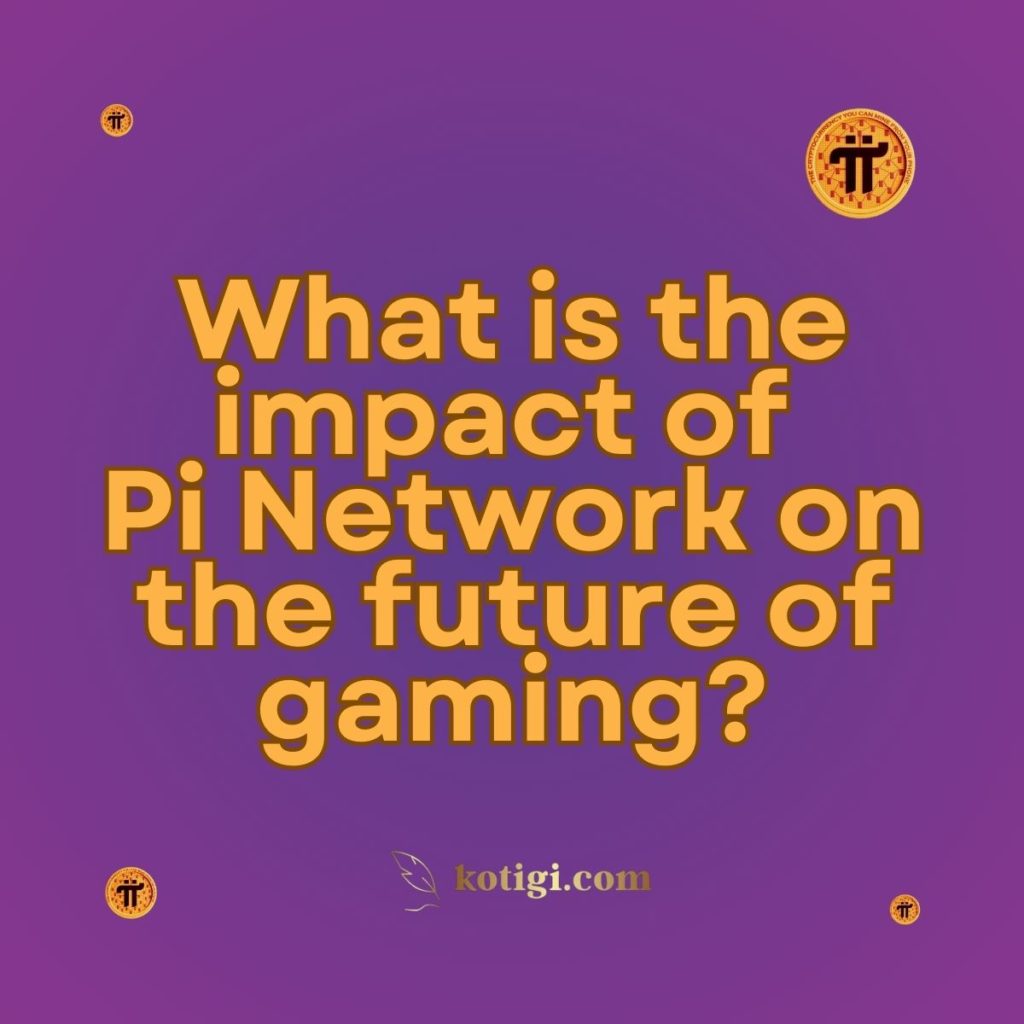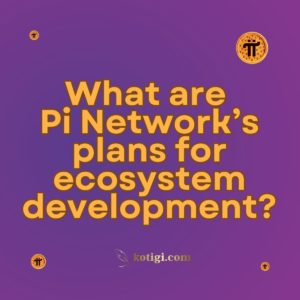
What is the impact of Pi Network on the future of gaming?
Pi Network is transforming the future of gaming by enabling decentralized ecosystems, empowering player ownership, introducing new monetization models, fostering community engagement, enhancing security, and promoting innovative gaming experiences. This article explores how Pi Network is reshaping the gaming industry and driving its evolution in the digital age.
Introduction
The gaming industry is undergoing a rapid transformation, driven by advancements in technology and changing player expectations. One of the emerging forces shaping the future of gaming is Pi Network, a decentralized cryptocurrency platform that allows users to mine Pi coins on their mobile devices with minimal resource usage. Beyond its financial benefits, Pi Network is creating new opportunities for the gaming world, enabling decentralized ecosystems, empowering player ownership, introducing innovative monetization models, and enhancing security. In this article, we will explore the significant impact Pi Network could have on the future of gaming.
Decentralized Gaming Ecosystems
Pi Network’s decentralized structure introduces new possibilities for gaming ecosystems, offering players greater autonomy and control.
Player-Centric Economies
Decentralized gaming ecosystems allow players to participate in player-owned economies, where they can buy, sell, and trade in-game assets without relying on centralized platforms. Pi Network enables this model by facilitating transactions with Pi coins, offering a secure and transparent way for players to engage in the gaming economy. This shift can lead to more equitable experiences where players can directly influence the in-game economy.
Decentralized Game Development
Game developers can leverage Pi Network to create decentralized games that run on blockchain technology, eliminating the need for centralized servers. Decentralized development allows for greater transparency in game mechanics, updates, and governance. Players can even become part of the development process, having a say in future changes or content releases, creating a more collaborative relationship between developers and gamers.
Self-Governed Communities
With Pi Network, gaming communities can adopt self-governance models, allowing players to vote on important decisions regarding game updates, features, and rule changes. This community-driven governance fosters greater trust and engagement, as players can actively shape the direction of the games they play. The transparency and fairness brought by blockchain technology reinforce this model.
Empowering Player Ownership
Pi Network is revolutionizing how players own, use, and trade digital assets within gaming environments.
Ownership of In-Game Assets
Traditionally, players invest time and money in virtual assets, but their ownership is often limited by the game’s terms and conditions. Pi Network enables true ownership of in-game assets by tokenizing them on the blockchain. Players can possess digital items such as weapons, skins, or virtual real estate, which they can sell or trade across games or platforms using Pi coins.
Cross-Platform Asset Transfers
One of the most significant barriers in gaming is the inability to transfer assets between different games or platforms. Pi Network’s blockchain framework makes it possible to seamlessly transfer assets across multiple games, allowing players to retain value even if they switch between different gaming environments. This cross-platform flexibility enhances the player experience and opens new opportunities for interconnected gaming ecosystems.
Secondary Marketplaces for Gaming Assets
Pi Network facilitates the creation of secondary marketplaces where players can buy, sell, and trade in-game assets using Pi coins. These decentralized marketplaces operate without intermediaries, providing players with greater freedom and financial control over their digital goods. The ability to earn and spend Pi coins in these transactions empowers players to monetize their in-game efforts.
New Monetization Models for Gamers
Pi Network enables innovative monetization models that benefit both gamers and developers.
Play-to-Earn Models
With Pi Network, the play-to-earn (P2E) model becomes more accessible, allowing players to earn Pi coins through in-game achievements, victories, or participation in tournaments. Players can convert these earnings into real-world value or use them to enhance their in-game experience. This model transforms gaming from a purely recreational activity into a potential source of income for dedicated gamers.
Tokenized Rewards
In addition to traditional rewards, game developers can introduce tokenized rewards in the form of Pi coins. Players who complete challenges, quests, or in-game tasks can be rewarded with cryptocurrency, incentivizing engagement and retention. Tokenized rewards provide players with tangible benefits, creating more immersive and rewarding gameplay experiences.
Crowdfunding Future Games
Pi Network can facilitate crowdfunding for new games, where developers can seek funding directly from the gaming community. By contributing Pi coins, players can support the development of games they are excited about and even gain early access or exclusive in-game perks. This direct funding model fosters a closer relationship between players and developers, ensuring that new games align with community interests.
Fostering Community Engagement
Pi Network enhances community engagement, offering more collaborative and interactive gaming experiences.
Collaborative Game Design
By decentralizing game development, Pi Network allows players to participate in the design and development process. Players can contribute ideas, vote on potential updates, or suggest new features, giving them a sense of ownership over the game. This collaborative approach fosters deeper community involvement and creates more player-centered gaming experiences.
Social Gaming Networks
The Pi Network ecosystem can facilitate social gaming platforms where players form communities, share strategies, and collaborate on in-game tasks. These decentralized social networks are not governed by a single entity, allowing players to interact freely and form genuine connections within the gaming world. This model encourages long-term engagement and loyalty among gaming communities.
Incentivized Multiplayer Engagement
Multiplayer games can use Pi Network to incentivize teamwork and collaboration. Players can earn Pi coins for participating in team-based activities, completing group missions, or contributing to the success of the gaming community. This incentivized engagement strengthens bonds between players and encourages positive interactions within the gaming space.
Enhancing Security in Gaming
Security is a critical concern in the gaming industry, and Pi Network offers solutions that improve the safety and integrity of gaming experiences.
Fraud Prevention and Anti-Cheating
By leveraging blockchain technology, Pi Network can help prevent fraud and cheating in games. Every transaction and in-game action can be recorded on the blockchain, ensuring transparency and preventing tampering or manipulation. This level of security is crucial in competitive gaming environments where fair play is essential.
Protecting Digital Assets
Players invest considerable time and money into acquiring in-game assets, but these can often be lost due to hacks or server failures. Pi Network’s decentralized storage of digital assets ensures that players’ items are securely stored on the blockchain, reducing the risk of loss or theft. This added layer of security enhances player trust in the gaming ecosystem.
Secure Payment Processing
With the rise of microtransactions in gaming, secure payment processing is vital. Pi Network’s blockchain offers secure, fast, and transparent transactions, minimizing the risks associated with traditional payment systems. Players can use Pi coins for in-game purchases, with the assurance that their financial data is protected.
Promoting Innovative Gaming Experiences
Pi Network paves the way for entirely new types of gaming experiences, enabled by its decentralized and blockchain-based infrastructure.
Blockchain-Based Game Mechanics
Developers can create blockchain-based game mechanics that introduce new gameplay elements, such as provably fair outcomes, transparent decision-making processes, and decentralized governance. These mechanics can result in unique gaming experiences where players have more control over how the game evolves and operates.
Virtual Reality and Augmented Reality Integration
Pi Network can also support the integration of virtual reality (VR) and augmented reality (AR) in gaming. Blockchain-powered VR and AR experiences offer immersive worlds where players can engage with their environment in ways that were previously unimaginable. By incorporating Pi coins into these experiences, players can buy, sell, and trade assets within these virtual worlds, blurring the lines between reality and gaming.
Esports and Competitive Gaming
Pi Network can enhance the esports industry by enabling secure transactions, reward systems, and player compensation. Competitive gamers can earn Pi coins through their performance, with blockchain ensuring transparency and fairness in rewards distribution. This model can lead to more professional opportunities for gamers in the growing esports landscape.
Conclusion
Pi Network’s impact on the future of gaming is multifaceted, offering decentralized ecosystems, empowering player ownership, introducing new monetization models, enhancing community engagement, bolstering security, and promoting innovative gaming experiences. As blockchain technology continues to evolve, Pi Network is set to play a pivotal role in shaping the gaming industry, offering players and developers new opportunities for collaboration, creativity, and economic participation. With Pi Network, gaming is poised to become more inclusive, secure, and dynamic, opening doors to unprecedented experiences in the digital realm.
Key Takeaways
- Decentralized Gaming Ecosystems: Pi Network fosters decentralized gaming economies, where players can engage in peer-to-peer transactions and participate in self-governed communities.
- Player Ownership: Players can own, trade, and transfer in-game assets across platforms, providing true digital ownership.
- New Monetization Models: Play-to-earn models, tokenized rewards, and crowdfunding allow players and developers to monetize gaming experiences in new ways.
- Community Engagement: Collaborative game design and incentivized multiplayer activities foster deeper community involvement in gaming.
- Enhanced Security: Pi Network improves security by preventing fraud, protecting digital assets, and ensuring safe payment processing.
- Innovative Gaming Experiences: Blockchain-based mechanics and VR/AR integration promise groundbreaking new gameplay opportunities.





